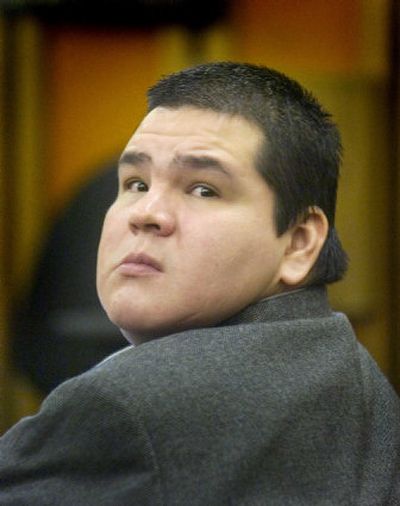Doney gets 35 years for toddler’s death

Child killer Robert L. Doney Jr. got an above-standard sentence Wednesday that was far less than the 75 years prosecutors said he deserved.
The 30-year-old defendant got a 35-year sentence calculated to keep him in prison until he is eligible for Social Security. He faced a standard maximum of 27 3/4 years.
Doney deliberately beat 2-year-old Victoria Ramon to death last December as a means of hurting her mother. Doney had been arguing with Ramon’s mother, Joan Richards, and committed the murder when Richards stepped out of the apartment they shared at 1412 W. Dean to call for help.
Witnesses said Doney taunted Richards with what he had done.
He was the “epitome of evil,” Deputy Prosecutor Larry Steinmetz told Superior Court Judge Jerome Leveque.
Joan Richards didn’t speak, but members of her family agreed with Steinmetz.
“I just want you to give this animal the fullest, longest sentence possible for what he did to my niece,” Kathy Richards told Leveque. “She was very innocent and didn’t deserve the way that she got killed. I want him to burn in hell.”
But Doney’s relatives described him as a kind and caring person.
“I remember him walking me to school, making sure I was safe,” his younger sister, Christina Doney, said.
Later, she said, he helped her raise her first child.
Doney’s grandmother, Betty Rogers, and his cousin, Bernie Brockey, attributed the crime to alcohol. Doney’s mother, Debra Doney, said he loved Victoria and called her “Baby Girl.”
Joan Richards testified in Doney’s trial that he resented Victoria, who was half Hispanic, and that he called her by a vulgar ethnic slur.
Doney tried at trial to blame the toddler’s death on Richards, but pleaded guilty to first-degree murder on March 16 – in midtrial – in an apparent attempt to avoid above-standard punishment. Washington’s sentencing law was in turmoil at the time, and court-appointed defense attorney Tim Trageser argued that Leveque lacked authority to have a jury consider aggravating circumstances.
Leveque disagreed and impaneled a jury that opened the door to an above-standard sentence by ruling last month that Doney was guilty of deliberate cruelty and of targeting an exceptionally vulnerable victim.
Trageser said Wednesday that Doney’s guilty plea was prompted by repentance, not legal strategy.
“I hope everybody can go on with their lives. I will try to better myself where I am going,” Doney said. “I know Baby Girl is in a better place and can finally be at peace.”
His repentance didn’t keep him from making a heated, finger-wagging objection, directed to Trageser, when Steinmetz called for Leveque to order Doney to pay $2,500 toward Trageser’s fees.
Steinmetz also called for Leveque to impose a $25,000 fine that could soak up any money Doney might earn from publishing a book about his crime or giving a television interview, but Leveque declined both requests.
The judge said he believed Doney was sorry, and he believed family members who described him as caring and loving. But, Leveque added, “he committed a brutal, vicious killing. That’s the other Mr. Doney, and that’s the one I have to deal with.”
Leveque applied a broad brush to Doney and other adults in Victoria Ramon’s short life.
“That child had suffered before she was killed,” Leveque said. “She has suffered, in my mind, by being in an environment that was neglectful of her, neglectful of her life and her existence, of her needs and her rights to be cared for and protected. …That’s what I will never understand. I will never understand.”